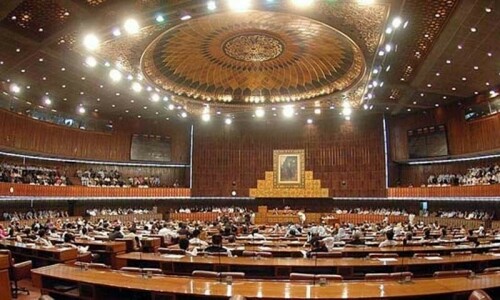ISLAMABAD: The Supreme Court ruled on Thursday that the Muslim Personal Law did not vest husbands with the right to casually deny the paternity of a child bore to them by their wives.
“Children born during the subsistence of marriage are presumed to be legitimate,” said a judgment issued by a two-judge bench while overturning a Lahore High Court verdict.
The bench comprises Justice Jawwad S. Khawaja and Justice Sarmad Jalal Osmany.
“Except under extremely limited circumstances and within a very limited period after birth, this presumption cannot be rebutted by any evidence, including DNA test,” the verdict said.
The eight-page judgment narrates the story behind the case.
In 1997, Ms Ghazala Tehseen Zohra, the appellant, became the first wife of a local landowner, Mehr Ghulam Dastagir Khan, and subsequently bore him two children.
When the husband took a second wife, the first wife went to the court claiming a secure monthly maintenance for herself and the two children. But the husband divorced her, refused to own the children and sought a declaration to this effect from a local court.
Seven years later, just before the paternity trial was about to conclude, the husband sought permission from the court to introduce DNA evidence. When the court turned down the request, he took the matter to the high court which granted his request.
The woman moved the Supreme Court which accepted her appeal eight years later.
“While the presumption of legitimacy attached to children born during marriage is a long-standing rule of Muslim Personal Law, some confusion seems to have been created in this regard by Article 128(1 a) of the Qanun-i-Shahadat Order (QSO), 1984,” the SC judgment said.
The provision suggests that no such presumption remains in a case where “the husband had refused, or refuses, to own the child”.
The apex court clarified that Article 128(1 a) of the QSO must be read in line with letter and spirit of Section 2 of the West Pakistan Muslim Personal Law (Shariat) Act, 1962. This statutory provision stipulates that in issues of “legitimacy or bastardy”, where the parties concerned are Muslim, the courts shall apply rules of Muslim Personal Law derived from the Shariah.
Under these rules, a father cannot deny the paternity of children bore to him by his wife, even through evidence, unless he expressly makes this denial within 40 days after the child’s birth.
Since the father had made no such timely denial in the case at hand, the court deemed the disputed children legitimate, even in the absence of DNA evidence.
Taking stern notice of the high court’s decision, the Supreme Court clarified that the well-known rules regarding presumption of children’s legitimacy must be strictly adhered to. It emphasised that jurists in the Islamic tradition who expounded these rules “were not unaware simpletons lacking in knowledge”.
“The conclusiveness of proof in respect of legitimacy of a child was properly thought out and quite deliberate… the law does not give a free licence to individuals and, particularly unscrupulous fathers, to make bald assertions and thus to stigmatise children as well as their mother,” the judgment said.
Published in Dawn, March 20th, 2015
On a mobile phone? Get the Dawn Mobile App: Apple Store | Google Play












































